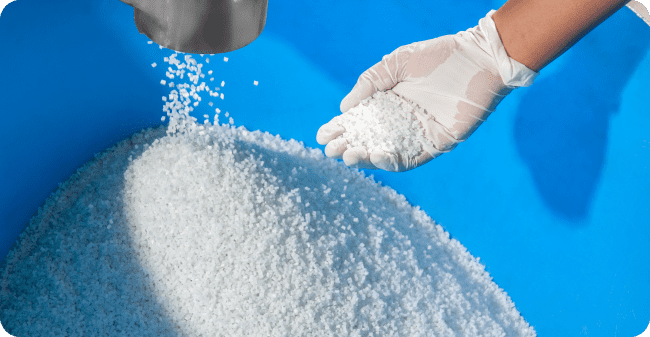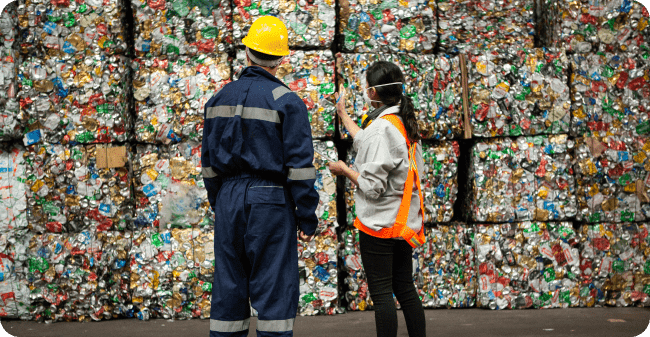TRADING WASTE COMMODITIES
The Global Waste Marketplace
WasteTrade is the pioneering online marketplace that connects waste generators, such as manufacturers, with recyclers and end users of waste commodities around the globe.
Buy Material
- All WasteTrade buyers are fully accredited and certified
- All sellers are fully vetted to ensure accurate listings
- Year-round access to thousands of tonnes of materials
- Filter by precise specifications to find suitable listings
Sell Material
- Access our global network of verified recycling facilities
- Maximise the value of your waste commodities
- Recycle your materials ethically with full transparency
- A carbon-efficient circular economy for your waste

Find us at Hall 10, Stand U31
Eco Solutions for the Waste Industry
Circular Economy

CARBON REDUCTION
WasteTrade has partnered with ThinkCarbon, an artificial intelligence based carbon analysis tool to minimise the carbon footprint of the waste sector and introduce more environmentally conscious practices into the industry.

TRUST & RELIABILITY
WasteTrade eliminates the risks involved in dealing with suppliers or end users who are unknown to you or who operate in other countries as we are the only entity you deal with.

COMPLIANCE
WasteTrade handles all paperwork and ensures that you are fully compliant and up to date with all regulations and legislation, removing the stress from the global waste management industry.

PROFITABILITY
WasteTrade allows you to easily compare bids to find the most lucrative offers while also reducing the overall transport costs and guaranteeing payment for your materials.

HAND-HELD SERVICE
WasteTrade guides you through the process step by step to make it quick and easy for you to navigate. We provide support on all areas of the process from buying to selling as and when required.
How it Works
Materials
About us
Our Mission
WasteTrade is the pioneering online marketplace that connects
waste generators and re-processors around the world in a secure virtual environment.
WasteTrade materials. Sell your material with us.
PET Recycling
PET - PET is the abbreviation for Polyethylene Terephthalate, which is formed when ethylene glycol and terephthalic acid are combined. It is a clear plastic that is both strong and lightweight enough to be popularly used for food and beverage packaging, with close to all single-use plastic drinks bottles being made from PET. It is also a popular choice for a great many other products, such as bottles for hygiene products and even tennis ball cannisters.

HDPE Recycling
HDPE - HDPE is the abbreviation for High-Density Polyethylene, which is made from the monomer ethylene. It is a thermoplastic, which means that it can become softer when heated in order to be moulded and will then harden when cooled without any alteration to the material’s properties. The material is incredibly versatile as it is lightweight, strong, malleable, impact resistant, weather resistant and long lasting. It is used across a wide variety of products over a range of different industries. For example, it is used for milk jugs, fuel tanks, piping, children’s toys, and even bread bags and cereal box liners.

PVC Recycling
PVC - PVC is the abbreviation Polyvinyl Chloride. It is made by the combination of chlorine and ethylene to form the monomer vinyl chloride, which is then sequenced to make the polymer Polyvinyl Chloride. PVC is a very strong and tough material that can be easily shaped, which gives it many different uses in terms of what it can be manufactured into. PVC can also be made soft and flexible when mixed with certain additives. This means that whereas PVC can be used for construction, automotive and medical items, it can also be used for items such as polyvinyl flooring, clothing and upholstery.

LDPE Recycling
LDPE - LDPE is the abbreviation of Low-Density Polyethylene, which is made from the monomer ethylene. LDPE is a thermoplastic, which means that when heated it can become softer in order to be moulded and will then harden when cooled without any alteration to the material’s properties. The plastic is lightweight, strong, impact resistant and chemical resistant. LDPE is an ideal material for the manufacturing of thin, flexible products such as plastic bags, shrink-wrap, stretch film, container lids, squeezable bottles and so on.

PP Recycling
PP - PP is the abbreviation of Polypropylene, which is a thermoplastic made from the monomer propylene. Being a thermoplastic means that when heated it can become softer in order to be moulded and will then harden when cooled without any alteration to the material’s properties. PP is tough, lightweight, chemical resistant and moisture resistant. The plastic is used for a wide range of products, such as packaging products, automotive parts and consumer goods.

EPS Recycling
EPS - EPS is the abbreviation for Expanded Polystyrene. Polystyrene is a polymer made from the monomer styrene, and EPS is made from beads of Polystyrene expanded by gas. It is lightweight and tough and is good for use as insulation. It is used in a number of different products such as packaging material, furniture and sports equipment.

PET Recycling
PET - PET is the abbreviation for Polyethylene Terephthalate, which is formed when ethylene glycol and terephthalic acid are combined. It is a clear plastic that is both strong and lightweight enough to be popularly used for food and beverage packaging, with close to all single-use plastic drinks bottles being made from PET. It is also a popular choice for a great many other products, such as bottles for hygiene products and even tennis ball cannisters.

HDPE Recycling
HDPE - HDPE is the abbreviation for High-Density Polyethylene, which is made from the monomer ethylene. It is a thermoplastic, which means that it can become softer when heated in order to be moulded and will then harden when cooled without any alteration to the material’s properties. The material is incredibly versatile as it is lightweight, strong, malleable, impact resistant, weather resistant and long lasting. It is used across a wide variety of products over a range of different industries. For example, it is used for milk jugs, fuel tanks, piping, children’s toys, and even bread bags and cereal box liners.

PVC Recycling
PVC - PVC is the abbreviation Polyvinyl Chloride. It is made by the combination of chlorine and ethylene to form the monomer vinyl chloride, which is then sequenced to make the polymer Polyvinyl Chloride. PVC is a very strong and tough material that can be easily shaped, which gives it many different uses in terms of what it can be manufactured into. PVC can also be made soft and flexible when mixed with certain additives. This means that whereas PVC can be used for construction, automotive and medical items, it can also be used for items such as polyvinyl flooring, clothing and upholstery.

LDPE Recycling
LDPE - LDPE is the abbreviation of Low-Density Polyethylene, which is made from the monomer ethylene. LDPE is a thermoplastic, which means that when heated it can become softer in order to be moulded and will then harden when cooled without any alteration to the material’s properties. The plastic is lightweight, strong, impact resistant and chemical resistant. LDPE is an ideal material for the manufacturing of thin, flexible products such as plastic bags, shrink-wrap, stretch film, container lids, squeezable bottles and so on.

PP Recycling
PP - PP is the abbreviation of Polypropylene, which is a thermoplastic made from the monomer propylene. Being a thermoplastic means that when heated it can become softer in order to be moulded and will then harden when cooled without any alteration to the material’s properties. PP is tough, lightweight, chemical resistant and moisture resistant. The plastic is used for a wide range of products, such as packaging products, automotive parts and consumer goods.

EPS Recycling
EPS - EPS is the abbreviation for Expanded Polystyrene. Polystyrene is a polymer made from the monomer styrene, and EPS is made from beads of Polystyrene expanded by gas. It is lightweight and tough and is good for use as insulation. It is used in a number of different products such as packaging material, furniture and sports equipment.

PVC Recycling
PVC - PVC is the abbreviation Polyvinyl Chloride. It is made by the combination of chlorine and ethylene to form the monomer vinyl chloride, which is then sequenced to make the polymer Polyvinyl Chloride. PVC is a very strong and tough material that can be easily shaped, which gives it many different uses in terms of what it can be manufactured into. PVC can also be made soft and flexible when mixed with certain additives. This means that whereas PVC can be used for construction, automotive and medical items, it can also be used for items such as polyvinyl flooring, clothing and upholstery.

ABS Recycling
ABS - ABS is the abbreviation of Acrylonitrile Butadiene Styrene, a polymer made from the monomers acrylonitrile, butadiene and styrene. It is stiff, strong, impact resistant and chemical resistant. It is used in a number of different products such as computer parts, tools, plug socket faces and toys.

EPS Recycling
EPS - EPS is the abbreviation for Expanded Polystyrene. Polystyrene is a polymer made from the monomer styrene, and EPS is made from beads of Polystyrene expanded by gas. It is lightweight and tough and is good for use as insulation. It is used in a number of different products such as packaging material, furniture and sports equipment.

WASTETRADE LOGISTICS
Are you a haulier?
Join our growing network of Logistics partners and get
exclusive access to consignments all over the world.

News
Latest News
WasteTrade 2024: Year in Review
WasteTrade Growth In 2024, thousands of new members signed up to the WasteTrade Marketplace. Our platform reached far more people this year than we expected it to, with millions of individuals in 186 (out of 196) different countries around the world finding WasteTrade.com. Tens of thousands of active users clicked through our site hundreds of…
19 December, 2024
5 mins read
INC-5 | A Crucial Step Towards a Global Plastics Treaty
By George Kiernan |
INC-5 | A Crucial Step Towards a Global Plastic Treaty The scale of the global plastic pollution crisis cannot be overstated. From microplastics contaminating the most remote corners of the ocean to mountains of waste overwhelming landfill sites, the consequences of inaction grow more severe with every passing year. Addressing this environmental catastrophe demands international…
11 December, 2024
COP29 | The Urgent Need for Sustainable Waste Strategies
By George Kiernan |
Sustainable Waste Strategies at COP29 COP29 in Baku, Azerbaijan, concluded with a powerful emphasis on the urgent need for sustainable waste strategies as a critical tool in addressing the climate crisis. The International Solid Waste Association (ISWA) used the summit as a platform to call for nations to embed sustainable waste strategies into their climate…
25 November, 2024
The Recycling Industry Is on Its Knees | Viridor Avonmouth Closure
By George Kiernan |
Viridor, one of the UK’s largest recycling companies, recently announced the planned closure of its mechanical recycling facility in Avonmouth, citing prolonged market pressures and disappointing demand for recycled materials. In a statement, Viridor attributed the decision to what it called “persistently challenging” market conditions and delayed policy support for recycling targets initially outlined in…
8 November, 2024
Welcome to WasteTrade: The Global Waste Marketplace
Transforming the Waste Industry

At WasteTrade, we're transforming the way the world trades waste by connecting buyers and sellers from all corners of the globe. Our innovative online platform streamlines the entire process by automatically calculating shipping costs, documentation, exchange rates, and carbon footprint with just a click.
Browse our extensive consignments and easily sort listings by material type, specific plastic waste, or country of origin. With WasteTrade, plastic recycling is now more efficient and accessible than ever before.


Waste Plastic: Turning Trash into Treasure
Our platform brings transparency and trust to waste trading. With WasteTrade, you can securely trade waste materials while mitigating risks, ensuring regulatory compliance, and making informed decisions.
Partner with a Reliable Plastic Recycler
WasteTrade is your one-stop-shop for connecting with reputable plastic recyclers. Our platform simplifies the process of finding and partnering with trustworthy recyclers to help you achieve your sustainability goals.


Trade Waste with Confidence
Our platform brings transparency and trust to waste trading. With WasteTrade, you can securely trade waste materials while mitigating risks, ensuring regulatory compliance, and making informed decisions.
Join WasteTrade today and be part of the global waste trading evolution that's making a difference for the environment and the economy
- « Previous
- 1
- …
- 11
- 12
- 13
Frequently asked questions
WasteTrade is an online marketplace for the global waste industry. We bring both waste producers and processors and waste together in a supportive virtual environment to make dealing in waste commodities as easy and profitable as possible.
To get started on WasteTrade, you must first complete the registration process. Once you have submitted your information and we have reviewed and verified it, you will have full access to the WasteTrade marketplace. You can list your own waste materials for sale or place bis on the listings of other users; once you agree to a deal, sit back and let WasteTrade handle the transport, the compliance and the payments.
Using WasteTrade makes recycling waste commodities easier and more profitable, therefore serving as an incentive for businesses to recycle their scrap materials. As well as increasing the amount of waste that is recycled, thanks to partnership with ThinkCarbon, WasteTrade offers full carbon footprint visibility.
The global waste industry presents many barriers to businesses trying to recycle their materials, including: Compliance and regulation issues, transport and secure payments. As WasteTrade handles all of these issues, it has never been easier or more rewarding for businesses to ethically dispose of their waste.
On WasteTrade, buyers and sellers have full access to our marketplace. For sellers, we offer your materials exposure to our approved end users all around the world, increasing the likelihood of finding a suitable buyer. For buyers, we provide you the opportunity to source waste commodities from all around the world, increasing the availability of materials. For both parties, we organise transport, provide secure payments and ensure adherence to regulations.
With WasteTrade, your money is safe; as we secure payments from buyers before releasing the sellers materials.















